Demolition Contractors Orland Hills
Find top Demolition Company Near Me in Orland Hills
Receive 3 FREE Demolition Contractors Near Me quotes for your project today! Compare profiles, reviews, accreditations, portfolio, etc... and choose the best offer.

J.G Gagnon & Son's Excavation L.L.C
44 reviewsEpping, New Hampshire, United States, USJ.G. GAGNON & SON’S EXCAVATION L.L.C. We take pride in all the jobs we do. With 30 years of experience and pristine work ethics, we give every customer and job 200%. We have a passion, not only for the excavation work itself but, for our customers and their satisfaction! We treat and tackle every job as if it was our own. We take extreme pride in our finished product, always leaving our customers completely satisfied. We’re a small business located in Southern NH and offer services in -
- Services
- Why Us?
- Gallery
Get Quote
Always Underground Inc
3.316 reviews20603 Burl Court, 20603 Burl Ct, Joliet, 60433, USBuilding Trust with Quality Work Respected for our integrity, Gold Shovel Standard certified for safety About Us AUI is a full service Woman Owned Business, design build utility construction company specializing in wireless /wireline, aerial and underground projects. With over 60 years of experience AUI has been providing 24/7 emergency response to the most challenging of projects. Our design, build, turn-up and test teams are well positioned throughout Illinois, Indiana, Wisconsin, Michigan, Iowa, Ohio, Kentucky and eastern Missouri to be able to assist now. Our emergency response crews have mobilized to support storm damage and other natural disasters for decades. Please see our Services tab and check out our capabilities Working Together We offer an end-to-end client experience that includes seamless communication, budgeting, staffing, on-site organization, and solid, quality construction every time. Our relationships with over 80 jurisdictions in the Midwest provide our clients peace of mind their projects will be completed on time and on budget. Why Choose Us? We work with all stake holders to bring quality, infrastructure Projects to life. Call us today and bring our project management skills and extensive construction experience to your next project.
- Services
- Why Us?
- Gallery
Get Quote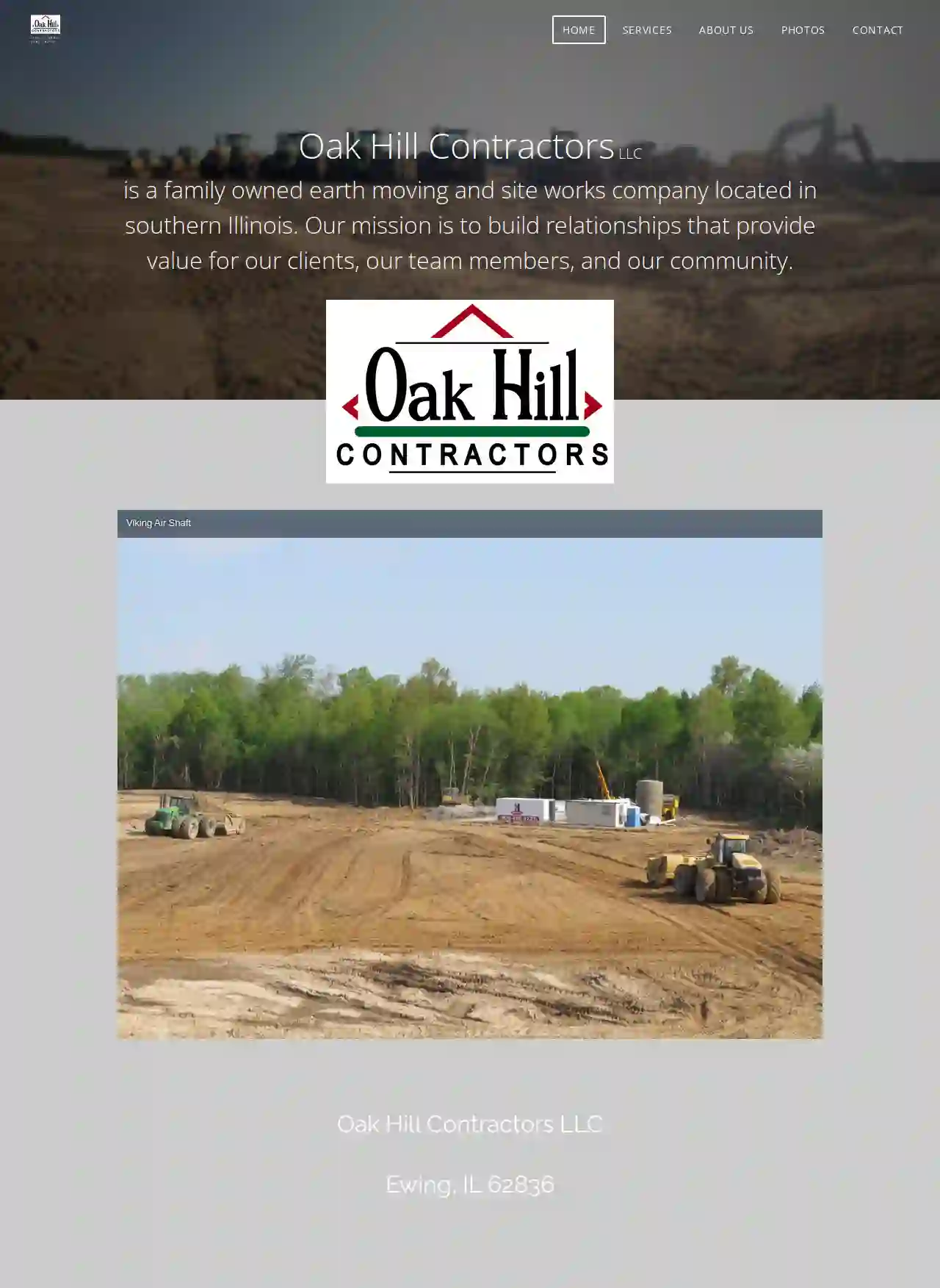
Oak Hill Contractors LLC
53 reviews20245 Ewing Road, Ewing, 62836, USAbout Oak Hill Contractors LLC Oak Hill Contractors LLC is a family-owned earth moving and site works company based in southern Illinois. We are dedicated to building strong relationships with our clients, team members, and the community, ensuring value for everyone involved. Our commitment to quality work and a wide range of equipment allows us to handle projects of all sizes. We utilize GPS-equipped machines for efficient and accurate grading work, ensuring precision and timely completion. We are proud to be Prequalified by IDOT and have MSHA-trained personnel. We are also fully insured, providing peace of mind to our clients. Take a look at one of our recent projects: Sugar Camp Refuse Expansion.
- Services
- Why Us?
- Gallery
Get Quote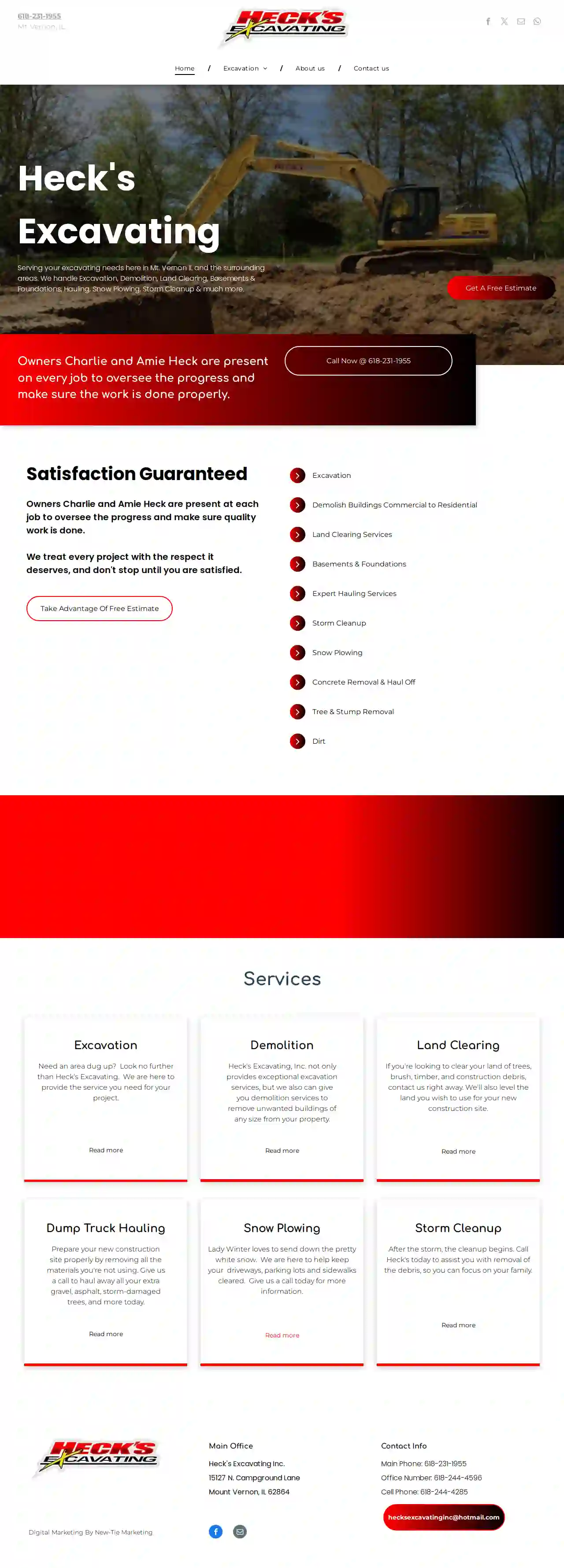
Heck’s Excavating
15127 N. Campground Lane, Mount Vernon, 62864, USHeck's Excavating: Your Trusted Partner for Excavation and More Heck's Excavating Inc. has been serving the Mt. Vernon, IL area and surrounding communities since 2009. We are a family-owned business dedicated to providing high-quality excavation, demolition, and other services with a commitment to customer satisfaction. Our Commitment to Quality Owners Charlie and Amie Heck are personally involved in every project, ensuring that every job is completed to the highest standards. We believe in treating every project with the respect it deserves, and we don't stop until you are completely satisfied. A Wide Range of Services From excavation and demolition to land clearing, basement and foundation work, hauling, snow plowing, and storm cleanup, Heck's Excavating is your one-stop shop for all your project needs. We are equipped to handle projects of all sizes, both residential and commercial. Experience the Heck's Difference We take pride in our work and treat every job as if it were our own home or office. Our commitment to quality, service, and customer satisfaction sets us apart. Choose Heck's Excavating for a reliable and trustworthy partner for your next project.
- Services
- Why Us?
- Our Team
- Gallery
Get Quote
F.L. Merrill Construction, Inc.
51 reviews35 Veterans Drive, Loudon, 03275, USProudly Serving New Hampshire Since 1990. Located In Loudon, NH Family Owned & Operated NH Construction Company Get A Quote Municipal Construction We specialize in road construction for small local subdivisions. Our expertise includes building, constructing, & repairing roadways. Commercial Construction Our New Hampshire commercial construction experience includes land clearing, site work, utility installation, and more. Residential Construction Whether you need help with excavation for a new septic system or any other excavation need, our team has 25+ years of experience. Who We Are A Dedicated Team Of Construction Experts F.L. Merrill Construction's success is built on a foundation of hard work and dedication, values that are shared by everyone from upper management to construction crew members. Frank and Sue Merrill realized their ability to provide customers with a superior service comes down to their team who are consider to be an extension of their family. By investing in its people, Merrill Construction has established itself as a NH construction industry leader for over three decades. Tell us about your project! Land Clearing Site Work Utility Installation Road Construction Bridge Construction Footing Foundations Residential Excavation Materials Supply Trucking & Dumping Get A Free Quote Today! Get A Quote
- Services
- Why Us?
- Testimonials
- Gallery
Get Quote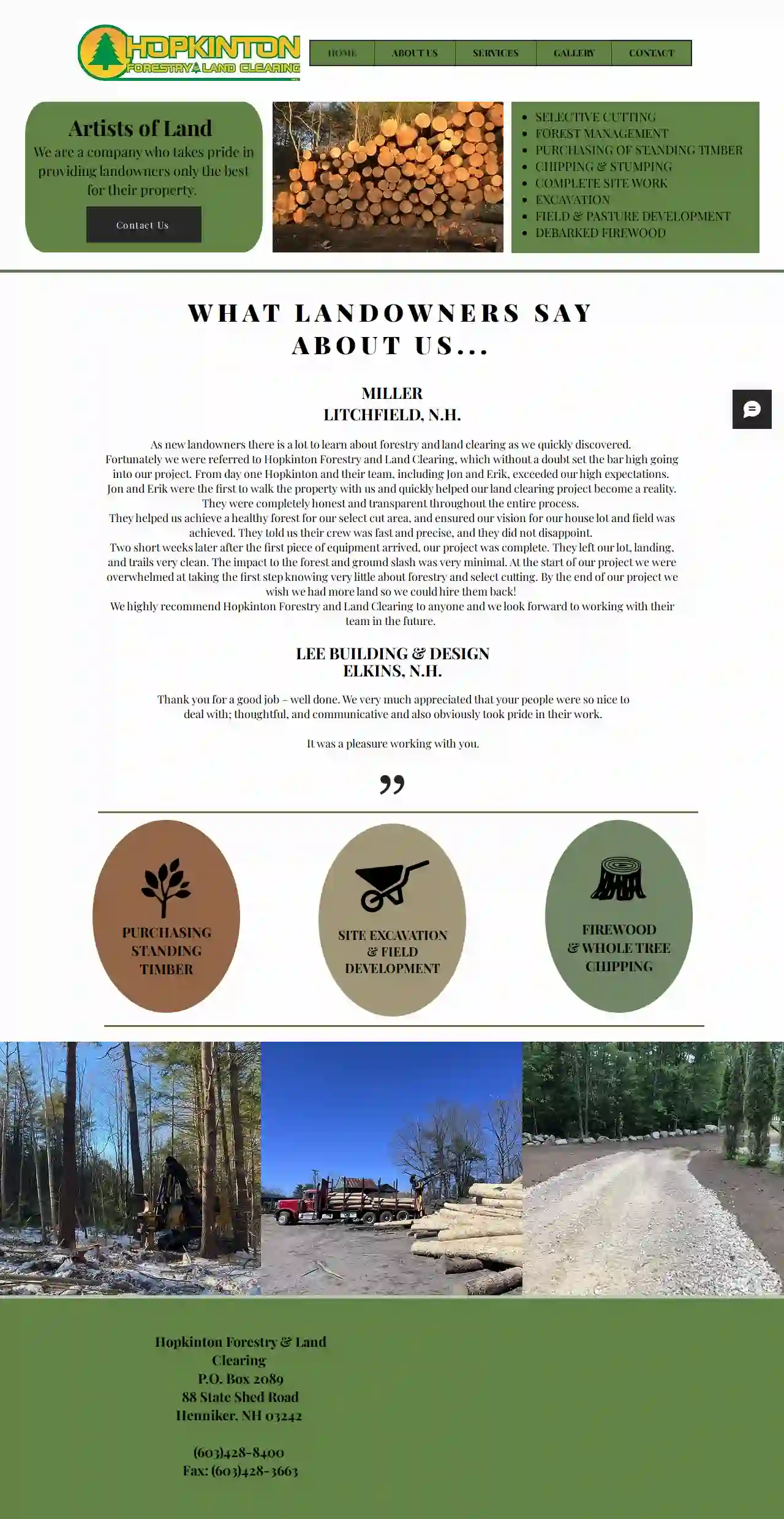
Hopkinton Forestry & Land Clr
52 reviewsP.O. Box 2089, 88 State Shed Road, Henniker, 03242, USArtists of Land We are a company who takes pride in providing landowners only the best for their property. As new landowners there is a lot to learn about forestry and land clearing as we quickly discovered. Fortunately we were referred to Hopkinton Forestry and Land Clearing, which without a doubt set the bar high going into our project. From day one Hopkinton and their team, including Jon and Erik, exceeded our high expectations. Jon and Erik were the first to walk the property with us and quickly helped our land clearing project become a reality. They were completely honest and transparent throughout the entire process. They helped us achieve a healthy forest for our select cut area, and ensured our vision for our house lot and field was achieved. They told us their crew was fast and precise, and they did not disappoint. Two short weeks later after the first piece of equipment arrived, our project was complete. They left our lot, landing, and trails very clean. The impact to the forest and ground slash was very minimal. At the start of our project we were overwhelmed at taking the first step knowing very little about forestry and select cutting. By the end of our project we wish we had more land so we could hire them back! We highly recommend Hopkinton Forestry and Land Clearing to anyone and we look forward to working with their team in the future. Thank you for a good job – well done. We very much appreciated that your people were so nice to deal with; thoughtful, and communicative and also obviously took pride in their work. It was a pleasure working with you.
- Services
- Why Us?
- Testimonials
- Gallery
Get Quote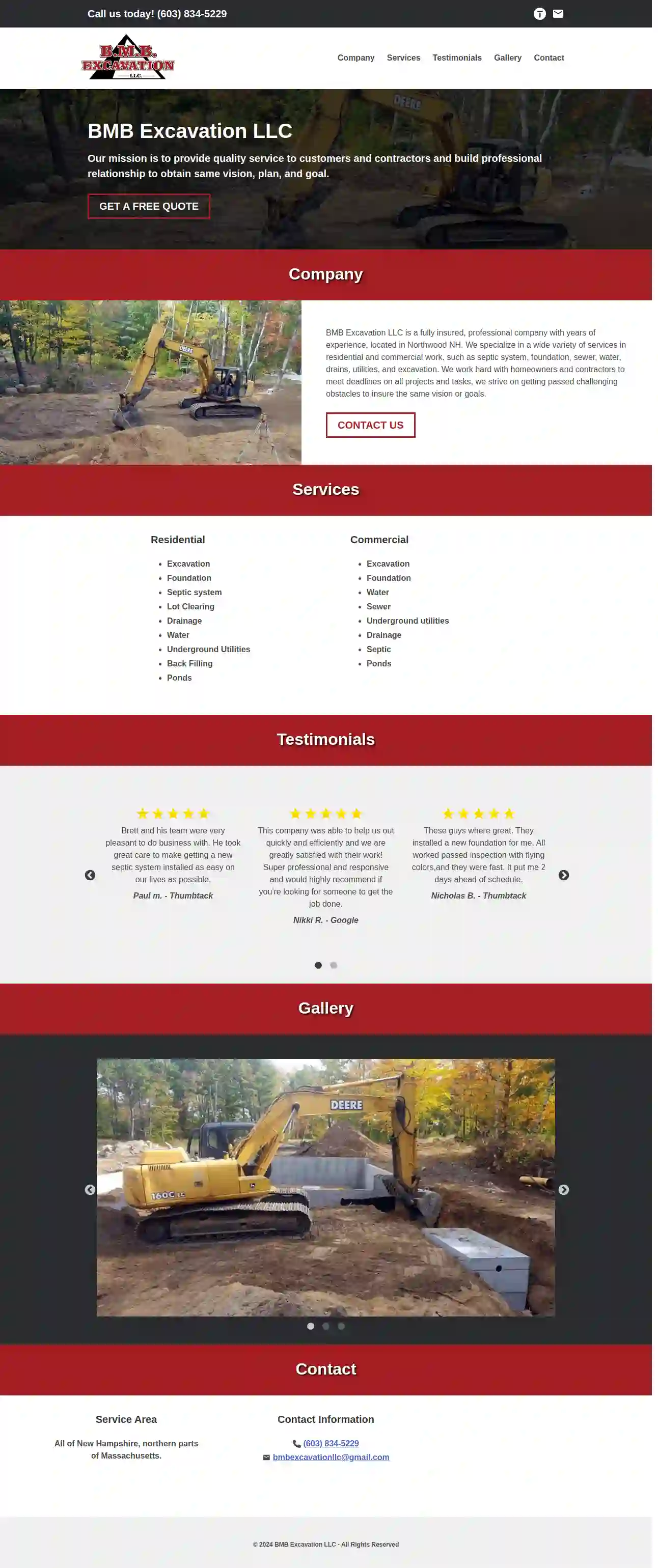
BMB Excavation LLC
44 reviewsNorthwood, USBMB Excavation LLC BMB Excavation LLC is a fully insured, professional company with years of experience, located in Northwood NH. We specialize in a wide variety of services in residential and commercial work, such as septic system, foundation, sewer, water, drains, utilities, and excavation. We work hard with homeowners and contractors to meet deadlines on all projects and tasks, we strive on getting passed challenging obstacles to insure the same vision or goals. Our mission is to provide quality service to customers and contractors and build professional relationship to obtain same vision, plan, and goal.
- Services
- Why Us?
- Testimonials
- Gallery
Get Quote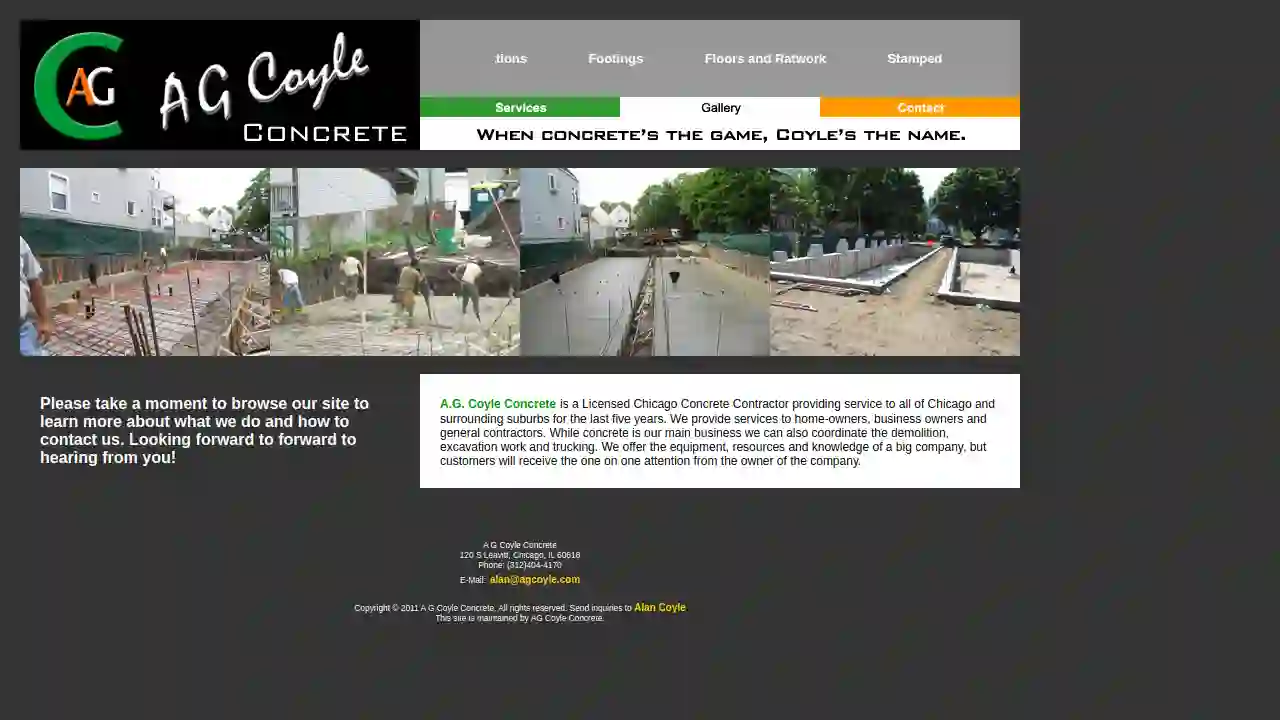
AG Coyle Concrete
120 S Leavitt, Chicago, 60618, USA.G. Coyle Concrete: Your Trusted Chicago Concrete Contractor A.G. Coyle Concrete is a licensed and experienced Chicago concrete contractor serving the city and its surrounding suburbs for the past five years. We are dedicated to providing top-notch concrete services to homeowners, business owners, and general contractors alike. While concrete is our core expertise, we also offer a comprehensive range of services, including demolition, excavation, and trucking. We bring the resources and knowledge of a larger company, but with the personalized attention you'd expect from a family-owned business.
- Services
- Why Us?
- Gallery
Get Quote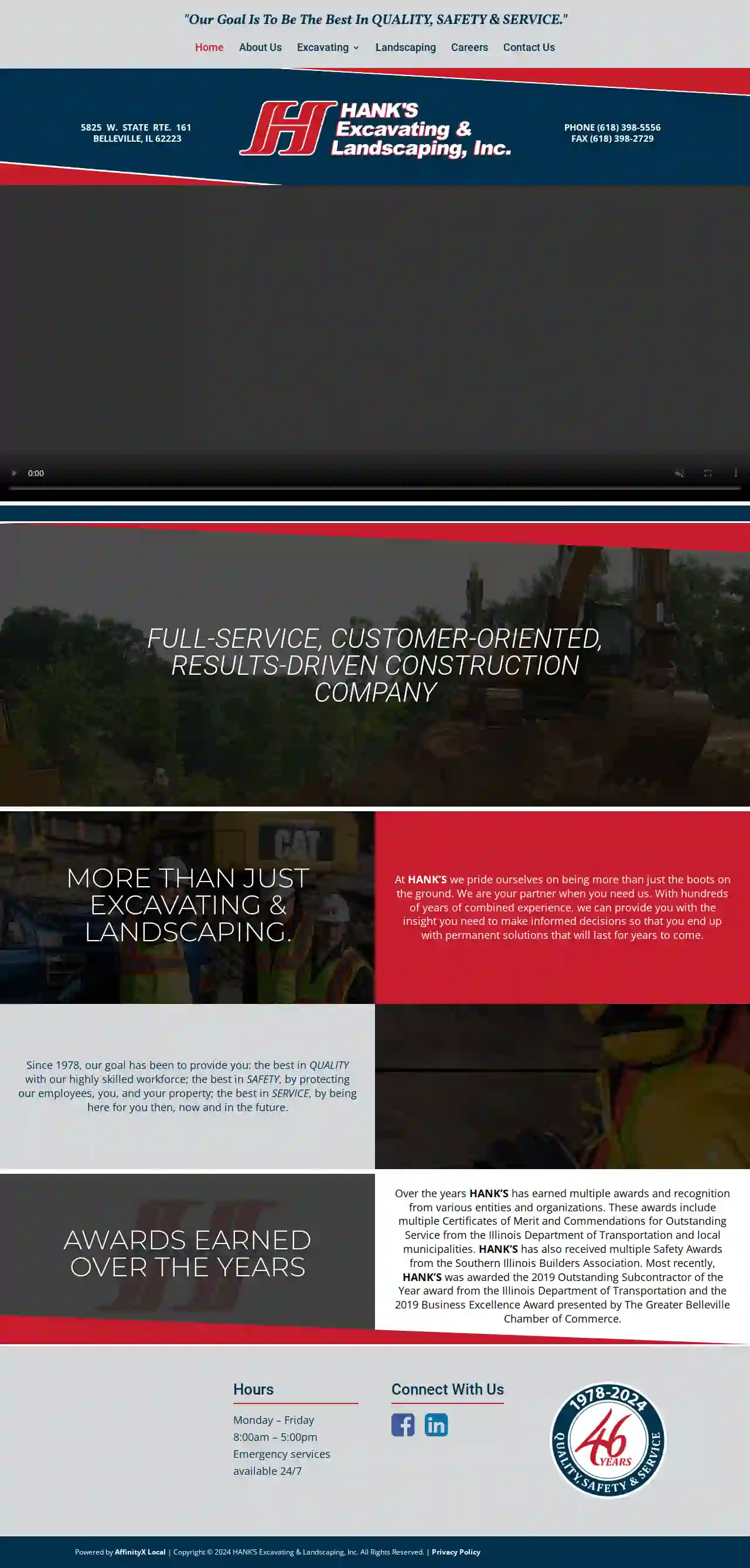
Hank's Excavating & Landscaping Inc
315 reviews5825 W. State Rt. 161, Belleville, 62223, USMore than just Excavating & Landscaping. At HANK’S, we pride ourselves on being more than just the boots on the ground. We are your partner when you need us. With hundreds of years of combined experience, we can provide you with the insight you need to make informed decisions so that you end up with permanent solutions that will last for years to come. Since 1978, our goal has been to provide you: the best in QUALITY with our highly skilled workforce; the best in SAFETY, by protecting our employees, you, and your property; the best in SERVICE, by being here for you then, now and in the future. Building the project is only one aspect of what we do Since 1978, our goal has been to provide you: the best in QUALITY with our highly skilled workforce; the best in SAFETY, by protecting our employees, you, and your property; the best in SERVICE, by being here for you then, now and in the future. Awards earned over the years Over the years HANK’S has earned multiple awards and recognition from various entities and organizations. These awards include multiple Certificates of Merit and Commendations for Outstanding Service from the Illinois Department of Transportation and local municipalities. HANK’S has also received multiple Safety Awards from the Southern Illinois Builders Association. Most recently, HANK’S was awarded the 2019 Outstanding Subcontractor of the Year award from the Illinois Department of Transportation and the 2019 Business Excellence Award presented by The Greater Belleville Chamber of Commerce.
- Services
- Why Us?
- Gallery
Get Quote
John Keno & Co
4.19 reviews8623 W Bryn Mawr Ave., Chicago, 60631, USJKC Overview Since 1946, John Keno & Company has provided world-class site preparation, excavating and shoreline development services throughout Chicagoland and along the shores of Lake Michigan. We are a third-generation, veteran-owned company with a deep commitment to safety, quality, and customer satisfaction. Our team of experienced professionals is dedicated to providing our clients with the highest level of service and expertise. Our Values Our values are the foundation of our success. We are committed to: World-class performance Serving as an excavation extension of your team Harnessing new technology to solve more problems
- Services
- Why Us?
- Gallery
Get Quote
Over 22,076+ Excavation Companies onboarded
Our excavation companies operate in Orland Hills & surrounding areas!
ExcavationHQ has curated and vetted the Best Excavation Businesses arround Orland Hills. Find the most reliable pro today.
Frequently Asked Questions About Demolition Contractors
- 'Can I see proof of your licensing and insurance?' Verify their credentials and coverage.
- 'What experience do you have with projects like mine?' Ensure they have relevant expertise.
- 'Can you provide references from past clients?' Check their reputation and customer satisfaction.
- 'What are your safety protocols?' Prioritize contractors who emphasize safety.
- 'How will you handle hazardous materials?' Ensure they have proper procedures for asbestos or lead abatement.
- 'What is your timeline for completing the project?' Understand the project duration.
- 'How will you manage noise, dust, and debris?' Discuss mitigation measures for minimizing disruption.
- 'What are your payment terms?' Clarify payment schedules and any required deposits.
- Size and Type of Structure: The method should be suitable for the structure's size, height, and construction materials.
- Site Location and Accessibility: The method should be feasible given the site's location, surrounding buildings, and access constraints.
- Environmental Considerations: Prioritize methods that minimize environmental impact, such as deconstruction or selective demolition if feasible.
- Budget: Different demolition methods have varying costs, so choose one that fits your budget.
- Safety: Prioritize methods that ensure worker safety and minimize risks to surrounding areas.
- Site Security: Secure the demolition site with fencing and warning signs to prevent unauthorized access.
- Personal Protective Equipment (PPE): Workers should wear appropriate PPE, including hard hats, safety glasses, gloves, and steel-toe boots.
- Hazardous Material Removal: Properly identify and remove asbestos, lead paint, or other hazardous materials before demolition begins.
- Utility Disconnections: Disconnect all utilities, such as electricity, gas, and water, before demolition.
- Controlled Demolition Techniques: Employ controlled demolition methods to minimize risks and ensure the structure comes down safely.
- Dust Control: Implement dust suppression measures, such as water spraying or misting, to reduce airborne particles and protect air quality.
- Emergency Planning: Have an emergency plan in place, including communication protocols and evacuation procedures, in case of unforeseen events.
- Project Assessment: The demolition contractor evaluates the structure, site conditions, and project requirements.
- Permitting: Obtain necessary demolition permits from local authorities.
- Site Preparation: Secure the site, disconnect utilities, and remove any valuable or reusable items.
- Hazardous Material Abatement: Professionally remove asbestos, lead paint, or other hazardous materials if present.
- Demolition: Execute the chosen demolition method, bringing down the structure safely and efficiently.
- Debris Removal and Site Cleanup: Sort, process, and dispose of demolition debris responsibly. Clean up the site to prepare it for future use.
What questions should I ask a demolition contractor before hiring them?
How do I choose the right demolition method for my project?
What are the safety precautions for demolition?
What are the steps involved in a typical demolition process?
What questions should I ask a demolition contractor before hiring them?
- 'Can I see proof of your licensing and insurance?' Verify their credentials and coverage.
- 'What experience do you have with projects like mine?' Ensure they have relevant expertise.
- 'Can you provide references from past clients?' Check their reputation and customer satisfaction.
- 'What are your safety protocols?' Prioritize contractors who emphasize safety.
- 'How will you handle hazardous materials?' Ensure they have proper procedures for asbestos or lead abatement.
- 'What is your timeline for completing the project?' Understand the project duration.
- 'How will you manage noise, dust, and debris?' Discuss mitigation measures for minimizing disruption.
- 'What are your payment terms?' Clarify payment schedules and any required deposits.
How do I choose the right demolition method for my project?
- Size and Type of Structure: The method should be suitable for the structure's size, height, and construction materials.
- Site Location and Accessibility: The method should be feasible given the site's location, surrounding buildings, and access constraints.
- Environmental Considerations: Prioritize methods that minimize environmental impact, such as deconstruction or selective demolition if feasible.
- Budget: Different demolition methods have varying costs, so choose one that fits your budget.
- Safety: Prioritize methods that ensure worker safety and minimize risks to surrounding areas.
What are the safety precautions for demolition?
- Site Security: Secure the demolition site with fencing and warning signs to prevent unauthorized access.
- Personal Protective Equipment (PPE): Workers should wear appropriate PPE, including hard hats, safety glasses, gloves, and steel-toe boots.
- Hazardous Material Removal: Properly identify and remove asbestos, lead paint, or other hazardous materials before demolition begins.
- Utility Disconnections: Disconnect all utilities, such as electricity, gas, and water, before demolition.
- Controlled Demolition Techniques: Employ controlled demolition methods to minimize risks and ensure the structure comes down safely.
- Dust Control: Implement dust suppression measures, such as water spraying or misting, to reduce airborne particles and protect air quality.
- Emergency Planning: Have an emergency plan in place, including communication protocols and evacuation procedures, in case of unforeseen events.
What are the steps involved in a typical demolition process?
- Project Assessment: The demolition contractor evaluates the structure, site conditions, and project requirements.
- Permitting: Obtain necessary demolition permits from local authorities.
- Site Preparation: Secure the site, disconnect utilities, and remove any valuable or reusable items.
- Hazardous Material Abatement: Professionally remove asbestos, lead paint, or other hazardous materials if present.
- Demolition: Execute the chosen demolition method, bringing down the structure safely and efficiently.
- Debris Removal and Site Cleanup: Sort, process, and dispose of demolition debris responsibly. Clean up the site to prepare it for future use.